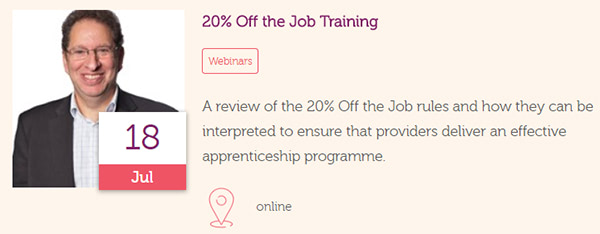Is it just the off-the-job rules affecting apprenticeship starts?

I had a number of responses from my FE News article last week on the 20% off the job training (OTJT) rules. Many agreed that in most cases the 20% OTJT can be managed by providers as long as the ESFA enables providers to interpret the rules to ensure that it benefits apprentices and employers and is not just another audit process.
What is clear is that employers just don’t have the time to understand the subtleties of ESFA rules and it’s up to providers to make this work while AELP pursues a more balanced and flexible approach.
However, the monthly figures for apprenticeship starts released last week confirm that starts are down and not yet picking up to ensure we deliver the 3 million target.
The 20% OTJT rules are affecting starts but what else is having an impact?
The Impact of the 20% OTJT rules
I for one did not think that the 20% rules would affect starts but it is clear that some employers still think they have to ‘release’ people from their jobs, that they will ‘lose’ people for a day a week and any training has to be ‘off’ and away from the job. It is taking time to convince them that this is not the case.
If the apprenticeship is a new job or involves significant learning, then there will be lots of opportunity while they are working to ensure they are getting the opportunity to learn and it will be clear they are not just doing their normal working duties.
If someone is working on a customer service desk and they do their first outbound calls they will be managed and supervised very closely. They may well get some detailed feedback so for me this is clearly off the job learning. It’s not surprising however given the terminology that employers get worried.
Frameworks to Standards Transition
Closely related to OTJT which sometimes gets mixed up with OTJT is the fact that some of the new standards have a lot of knowledge built into them. To deliver the standards, apprentices will need to be released off the job and for some even more than 20% of their time.
This is an issue with the standards and not the problem of the OTJT rules.
In other words, some providers are saying that the employers will have to release their apprentices off the job and have to backfill.
Where a large group of employers are not prepared or cannot afford to do that, then they need to look at the standards….and quickly.
Providers may also need to look at whether they have explored all the options of doing some of the learning in and at work but off the job in terms of the ESFA definition. Not easy I know.
10% employer contributions
The other issue having a big impact, in my view, is the 10% employer contribution which must be affecting some employers in some sectors. I accept the benefits of ensuring that the employer is committed to the programme by making a contribution but we know that they have to make a much bigger commitment in many other ways.
I think the government has to look seriously at the AELP proposals to widen the groups for whom the co-contribution is a requirement.
That is not a change of policy but an adjustment to the current rules.
Subcontracting Turmoil
The area of impact on starts that get fewer headlines is the turmoil created to contracting by the procurement exercises for non-levy provision and the changes to subcontracting.
Prime providers have reduced subcontracts and it is taking a lot longer to replace some of the employer contacts.
Link this to the very different decision making processes that many levy payers have introduced with extensive procurement processes of their own and it is not surprising that the numbers are down.
If you add on the reduction of funding in some sectors that makes quality delivery impossible and the lack of progress on bringing some standards forward, it is also going to have a negative impact on starts.
In the meantime, we have to ensure providers with ESFA support can interpret the 20% OTJT rules effectively driven by delivering high quality programmes and not audit rules.
Stewart Segal is CEO of Aegis Management Services Ltd and an AELP board director
Copyright © 2018 FE News
On Wednesday 18th July, AELP has a webinar to discuss how providers can support employers so we would welcome your views.












Responses